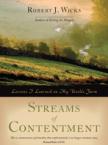Practicing Faithfulness
Special talents in writing, combined with a good heart and a life well lived, are needed to write a book on spirituality for a general audience. Robert J. Wicks has brought to the task of writing Streams of Contentment his many fond memories of summers in the Catskills, four decades of professional work as a psychologist (including important contributions in pastoral psychology at Loyola University Maryland) and many joys of being husband, father and friend. Henri J. M. Nouwen asks us on an early page, “Is there a still point where life is anchored, and from which I can reach out, with hope and courage and confidence?”
Wicks’s new book can help guide us all toward a similar encounter in the center of our psychological and spiritual being. Readers will be drawn to the author’s gentle but natural authority, created by his own life experiences—as a Marine Corps officer, helper and healer of other professionals who work in situations of trauma, and writer or editor of a bookshelf of highly regarded books on psychology and religion.
This vade mecum of good living consists of two parts: 15 chapters involving lessons and stories (“Practice a Little Faithfulness,” “Know What a Renewing Community Really Is,” “Mind Your Own Negative Predictions and Evaluations”) along with enough five-minute practical exercises (“Deeply Appreciate Impermanence,” “Beware the ‘Fastest’ Route,” “Enjoy Transparency”) to fill an entire month. There is a seamless transition of cognitive-behavioral psychology, insights from an entire United Nations of spiritual writers, including Anthony De Mello, James Herriot, Jon Kabat-Zinn, Kathleen Norris, Anthony Storr, Carlos Ruiz Zafon and many others who represent all points of the globe. We get to meet many interesting folks from Wicks’s own life. You may enjoy a chuckle or two when he describes interactions with psychologists in his professional life, experience wistfulness and longing for days gone by when reading his Catskill reveries or be deeply moved when he writes about his daughter’s struggles or the wisdom of a precocious granddaughter.
One of my favorite chapters asks us to be clear about what is truly essential in life. In his clinical work training professional health workers to be effective helpers in crisis or trauma situations, Wicks teaches the importance of recognizing the continuum of responses ranging from intense and immediate reaction to knowing when to remain detached. We often find ourselves in the same quandary when facing local, global or international situations of human need or systemic injustice. If we follow the fire truck to every disaster, we will soon wear ourselves out and be incapable of giving of ourselves to others in our own home or neighborhood. This chapter alone would make for great discussion in a parish meeting hall, bishops’ conference or even that precious small space whenever two or three are gathered in his name. “Your goal as a helper,” writes Wicks, “is encouragement and clarity, not forcing. Your goal is to be personally and professionally faithful to the process of helping people sit with the truth; success is nice, but it is not the goal.”
Anyone in need of regular emotional tune-ups might benefit from Wicks’s counsel on gestures of kindness, the importance of letting go, connecting with a healthy community, avoiding the tyranny of false hopes, emotional reasoning, blaming, projection and the importance of tolerance. Streams of Contentment will fit comfortably on (and make a unique contribution to) any bookshelf containing Alcoholics Anonymous’s “Big Book” and related 12-step literature. One chapter offers a 25-item examination of conscience pertinent to anyone contemplating the fourth or fifth steps, or those Catholics who may wish to consider receiving the sacrament of reconciliation more than just during the week before Easter.
There was one question in my mind as I read the book, one that could be applied to an entire genre of books published by Catholic publishers or articles and blogs in the Catholic media: “Where are the gifts and treasures that Christianity and the Catholic faith bring to our lives?” Many authors bend over backward to be fair to humanistic and other traditions—and this may be an effective strategic counterweight to excessive evangelizing, proselytizing or undue emphasis on four or five current issues that rankle and divide. Although Stream of Contentment is a highly personal memoir, I kept wondering as I read where Wicks’s obvious Catholic faith (he has been decorated by the Vatican) inspired his life. Toward the very end of the book, he counsels us to “decide on a theme or philosophy in your life” and makes a parenthetic observation, “Mine is: Be clear and be not afraid, for you are loved by God.”
Wicks’s book offers a compelling credo, but I was left wanting more.
This article also appeared in print, under the headline “Practicing Faithfulness,” in the November 7, 2011, issue.








